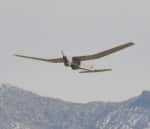U.S. drone manufacturer AeroVironment, Inc. has achieved over 9 hours of flight with its solar Puma AE small unmanned aircraft system (UAS).
Featuring the company’s latest battery, the flight lasted 9 hours and 11 minutes; which AeroVironment says is significantly longer than the flight endurance of small UAS currently commercially available.
Weighing just under 6 kilograms, the drone features ultra thin and light gallium arsenide solar cells manufactured by Alta Devices.
“Our integration of this cutting-edge technology dramatically increases Puma’s current flight endurance using a clean, renewable power source,” said Roy Minson, AeroVironment senior vice president and general manager, Unmanned Aircraft Systems (UAS).
The new battery extends Puma AE’s non-solar endurance to more than three hours.
The solar Puma AE is a hand-launched vehicle designed for intelligence, surveillance and reconnaissance (ISR) operations. While its military and law enforcement applications are obvious, it also can be used to assist in environmental monitoring, fire-fighting and search and rescue efforts.
The solar Puma AE is still in the research and development phase and a production version is planned for early next year.
In July, AeroVironment received a “Restricted Category” rating for its non-solar enabled Puma AE from the Federal Aviation Administration; which permits operators to fly Puma AE for commercial missions in regions of the Arctic.
AeroVironment says Puma AE will be deployed to support emergency response crews for oil spill monitoring and wildlife observation off the coast of the Beaufort Sea in the Arctic Circle.
AeroVironment has a long association with electric vehicles and drones. The company, established in 1971, provided AC induction motors, systems engineering, powertrain, mechanical design, thermal control and fabrication for the world’s first practical electric car, the GM Impact.
Produced and leased by General Motors Corporation from 1996 to 1999, Impact was launched by GM under the name of EV-1. The vehicle was a focus of the controversial documentary, Who Killed The Electric Car?














































